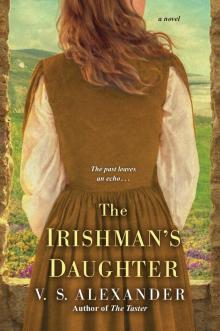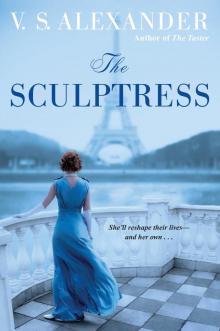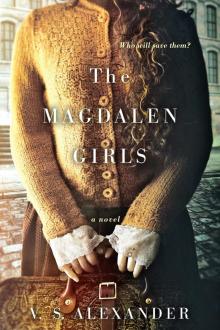- Home
- V. S. Alexander
The Irishman's Daughter Page 16
The Irishman's Daughter Read online
Page 16
He was tall, of medium build, neither corpulent nor thin, with ruddy cheeks despite the overall whiteness of his skin. His black sideburns spread out in a full brush near his chin. His lips were topped by a dark mustache; his hair, a rich obsidian, was thick and parted to the right in a full sweep. Upon seeing them, Sir Thomas’s mouth parted in a thin smile that was more an acknowledgment of his arrival than an expression of cordiality.
The driver leapt from his seat and extended the steps under the carriage door. Sir Thomas alighted from the coach with a confident gait, hat and cane in hand. He gave a curt nod and then stood waiting their acknowledgment. Briana watched as her father bowed and Lucinda curtsied.
She returned the nod, a bit flustered by the exchange of protocol. She no longer wanted to simper before him, nor was she awed by his social standing. A quiet reserve had grown inside her regarding the owner. Her attitude toward him had changed since she had seen him last, partly from her marriage to Rory and his distaste for the English and partly because of her sighting in Westport of food heading to England that could be used to feed the starving Irish. Twenty sacks of Indian corn transported from Belmullet to the store at Broadhaven Bay was all Rory had been able to secure. Now they were learning to cook and prepare it for the tenants at Lear House.
Sir Thomas stepped forward. He wore gray-striped pants, a white shirt, a blue ascot, and vest, all embraced by a waistcoat that accented his slim figure.
“I’m always happy to be here,” he said, and then breathed in deeply. “Insufferable journey, however. The voyage from Liverpool is trying, but spending the night in Belmullet can drive one to distraction.” He handed his hat and cane to her father and walked to Lucinda. Her sister held out her hand, and the landlord kissed it lightly. He then turned to Briana, who made no move of her own. Sir Thomas sloughed off the slight with a shift of his eyes that caught her attention. The landlord, with his glance, had taken her in—if she had to describe the feeling she would have said that he admired her, perhaps even desired her, but the look was brief and could have been misunderstood. Surely Lucinda had noticed her employer’s distraction and would bring up the matter later.
The driver and Brian unloaded two trunks from the back of the carriage and hauled them into the entry. With the driver’s help, the trunks were hoisted up the stairs to the Master’s bedroom. Brian soon returned, and the driver was sent off after words from Sir Thomas. A few tenants watched as the carriage jangled toward the village.
Sir Thomas, having taken his cane from the hall, settled in a wing chair parallel to the window. He looked out across the green lawn to the thin line of waves cresting in the bay. After contemplating the view for a minute he turned to Lucinda, who had taken a seat opposite him. “You’re looking well.” He swiveled the cane between his palms. “In fact, you’re all looking well, despite what I’ve been hearing about Ireland. I almost decided not to pay a visit this year . . . but Manchester can be quite inhospitable in the summer. Besides . . .” He looked at Briana, who sat next to her father on the sofa. “I cannot always be an absentee landlord. I have much business to discuss with your father.”
Brian nodded but said nothing.
“So how goes Lear House?” Sir Thomas asked, lifting a brow. “How are my tenants?”
An awkward silence spread across the room. Lucinda looked past the owner to the bay. Brian stared ahead as if unsure how to answer.
Briana broke the stillness. “People are starving—”
The words had barely come out of her mouth before her sister held up her hand. “Let’s not burden Sir Thomas with unfortunate details.”
“Of course, but we must be honest,” Briana replied.
“Boorishness can be confused with honesty, sister. There’s time enough to discuss such issues later. Sir Thomas must be tired from his journey.”
Blood rushed to her face. She wanted to slap the smug look off her sister but shrunk back in deference to her father, who looked at a loss for words. If Rory had been in the room he wouldn’t have let Lucinda get away with her pompous attitude.
Her father sighed. “We all could be better, but Lucinda is correct—we can discuss it later, after you’ve had a chance to go over the accounts.”
“Yes, I am tired,” Sir Thomas admitted as his face brightened slightly. “I’ve asked the Andersons, the Rogerses, and the Wards to join me early next week. They will be staying for a month or so. I’d like you all to join me at tea tonight so we can discuss how best to make them feel comfortable.”
“The Wards?” Lucinda asked.
“Yes, they’ll be bringing their three sons—the ones for whom you are governess. I assured the Wards that you would have no problem continuing the boys’ studies while they were here—with a stipend, of course.”
Lucinda put on a brave face, but Briana could tell that her sister was seething under her forced smile because she wanted only to capture the landlord’s attentions while he was in residence, not tutor three boys.
Her father’s face turned white and sullen. “Certainly we could use the money, but I wonder if inviting guests is the wisest course of action.... Begging your pardon, Sir Thomas, but the times are . . .” His voice faded in the air.
“Are what?” Sir Thomas asked with the feigned innocence of a child who had never sensed peril.
“Dangerous,” her father said.
“Really? It can’t be as bad as some in the government make it out to be.”
“It’s worse,” Briana said, “but we wouldn’t want to ruin your evening meal.” The acid in her voice burst through.
Sir Thomas paid no attention to the jibe. “Yes, tea is important. I’ll head upstairs for a rest. What am I being served tonight?”
“A surprise,” Briana said.
“Well, whatever it is, I’ve worked up an appetite. I look forward to it. See you at six o’clock.” He rose from his chair and walked as far as the stairs. “Do we have any of that good port left?”
Brian turned to him. “Yes, but we have an even better bottle of French brandy,” he said, referring to the remains of the bottle given to them by the Captain at Westport.
“Excellent.” Sir Thomas climbed the stairs, his heels clicking on the stone.
“Welcome back, sir,” Brian said to no one in particular as the Master’s bedroom door shut. “Lear House is not what it used to be.” He rested his chin on his intertwined fingers. “How am I going to tell him that we hardly have enough food for us let alone three other families?”
Lucinda, her eyes downcast after hearing Sir Thomas’s summer plans, shook her head and settled back in her chair.
Briana knew what she would have to ask her husband, and she dreaded the question.
* * *
“You want me to slaughter my pig for an Englishman?” Rory pitched his soiled shirt upon the straw bedding. “I’d rather cut its throat and feed it to my starving brethren—and that’s just what I’ll do to keep him from enjoying a feast.”
“Well,” Briana replied, “be stubborn and bring his wrath down upon our heads. He’ll find out soon enough how little food we have. We can roast the animal and make meals for days.”
“He’s going to be here for months,” Rory snapped.
“Yes, and you can’t avoid him all that time. Sooner or later, he’ll find out that we’re married and that you’re part of the Walsh family.” She wanted to tell him that more English families were coming for the summer but decided against it considering his present state.
Rory collapsed on the straw and covered his face with his hands, exhausted from helping his brother catch and preserve fish. In Jarlath’s canoe, they had taken advantage of the tranquil day in the inlets north of the bay.
She sat beside him and put her arm around his shoulders. “You smell like fish,” she said, hoping to bring a smile to his face. The salty tang of the catch and the rich ocean brine that saturated his body filled her nostrils.
He pulled away from her, in no mood for gentle jests. “You can tell
him we’re married. I’m in no need of his company—this evening or any other day.”
“How about a fish?” she asked. “A large one that will serve four of us—just for this evening. Sir Thomas is in for much bad news tomorrow. A good meal might soften the blow he’s about to take.”
“Ask Jarlath if he can spare a fish,” Rory said gruffly. “I’ll eat some of the Indian corn you’ve prepared.”
Her mouth puckered at the thought of eating the corn meal. What she, and for that matter all of Ireland, wouldn’t give for a good crop of potatoes! The next crop, if it didn’t fail, wouldn’t be in until August, a month that couldn’t arrive too soon as far as she was concerned. But aside from this day, and a few other splendid ones, when the sun shone clear and bright in a cloudless sky and the ocean reflected the blue serenity of the heavens, the spring had been a dull gray with uninterrupted bouts of rain. The relentless downpours and the muddy heath were enough to crush the brightest spirits.
The Indian corn gave the tenants no comfort, either. Rory and Brian had distributed the bags after hauling them from the store. They had been given freely, only for the recipients to find the meal unpalatable. The kernels took days to soften, hours to cook, and disintegrated to an unappetizing mush. Briana had asked many of the tenants’ wives if they knew a good way to cook the corn, but no one did. Most of the women had only cooked the potato in various ways. The meal was as foreign to them as something they might find on the other side of the world.
Realizing she was getting nowhere with her husband, Briana kissed him on the forehead and said, “I’ll take care of your clothes in the morning. Please don’t be angry with me. I need to be there for my father . . . and sister.”
Rory nodded and stretched out on the straw. She closed the door and walked along the back of the cabin. The pig was settled happily in the mud by the makeshift fence.
Jarlath was outside his home, adding fresh water and salt to an oak tray filled with fish.
“Your brother is in a bad mood,” she said. “He said I might ask you for a fish to prepare for the landlord’s supper.”
Jarlath and Rory shared many of the same physical characteristics: broad shoulders, sturdy legs, and weathered hands that affirmed their years of hard work in the fields. Lifting the tray, he asked, “For the Englishman?”
Briana nodded. An unexpected wave of shame swept over her.
“Rory was sullen the whole day,” Jarlath said. “It’s a waste to be so sad on a rare day like this.” He pointed west toward the sinking sun, which threaded the sky with translucent yellow beams.
“Please, Jarlath, I’ve no time to discuss our moods. I understand how you and Rory feel about Sir Thomas, but he has kept my family alive for many years. I need something to feed this man, or the devil will find a new home in Lear House tonight.”
He held the tray in front of her. “Take your pick. Salt is scarce. I can’t save the lot for long; we have to cook them within the day.”
Briana had cooked fish a few times in her life—they were rarely the main meal. She didn’t enjoy the gutting and cleaning, but she had no choice this evening.
Jarlath pointed to the catch. “Mackerel—we couldn’t haul in cod and pollock.”
She looked over the array of silver fish with the black stripes running vertically down their sides. One of them seemed as if it might feed four people. “I’ll take this one.” She lifted it and held it underneath the tail fin. The smaller fins leading up to the tail poked into her fingers. The fish wiggled in her hands.
“Be careful,” Jarlath said. “Sometimes you think they’re dead and they’re not.”
“Thank you.” She ran to the road, then to the kitchen door, all the while trying to hold the slippery creature in her hands. She was glad the kitchen was empty. She didn’t need her father or sister standing over her shoulder, souring her mood more than it was.
* * *
Lucinda declined to help Briana cook, wanting nothing to do with the chores that might stain her dress or cause her hands to smell like fish. However, her sister offered to serve, which Briana felt was a bit of a victory.
She scooped up the sizzling fillets with a wooden spatula and spooned them onto the delft plates. The preparation had been simple; they were coated with some of the remaining flour, pan fried in oil, and drizzled with buttermilk. They smelled strong and meaty, and Briana wondered if Sir Thomas would have an appetite for them. He would have to; otherwise, he would go hungry like the rest of County Mayo. Few supplies were left in the kitchen. Another week of the landlord in the house and the food would be gone.
“Is there nothing else to serve?” Lucinda asked.
Briana flinched at her sister’s presumption. She and Rory had been reduced to eating the imported meal, while her father and sister survived on the remaining grains and seed potatoes left in the larders. Bugs and rats had reduced even those stores despite their best efforts to keep them at bay.
“I can put out some of the Indian corn mush, if that’s what you’d like,” she told Lucinda. A smile rose on her face. “What a grand idea. Sir Thomas should see what the rest of us eat.”
“No,” her sister responded with a look of dismay. “He’ll be happy with the fish. Perhaps a nice breakfast tomorrow.”
“With what? The flour is almost gone. I might be able to scrape together oatmeal. Remember I have a husband to feed as well.”
Lucinda turned, her back quivering. From her position at the table, Briana heard the sobs coming from the other side of the room. She walked to her sister and put her hands on her shoulders. “Come now,” she said, “the fish will get cold. We’ll get by.” Even as she said the words, she imagined that life might become more difficult.
“You needn’t point out that I have no husband.” Lucinda, her face puffy from tears, faced her. “What will we do? Lear House has no food, no money. We’ll lose the only home we’ve ever known.” She placed her hands over her face and moaned.
Briana dabbed her sister’s eyes with her sleeve.
“I’ve tried so hard not to give in to fear, but ever since those starving people arrived . . .” Lucinda took out her handkerchief and wiped it across her face. “I must compose myself.... Sir Thomas can’t see me this way. I must look a fright.”
“You look fine, sister.” Briana’s eyes welled with tears because she understood her sister’s sorrow was about more than a lack of companionship. Lucinda was deeply concerned about their welfare.
Briana shook her head and tried to think of the fine spring day outside, anything to take her mind off the famine, but the memory of the starving came back to her, particularly the boy who had died in his mother’s arms. “I still see their faces. I even dream about them. But we can’t let fear stop us. We must be strong.”
Lucinda picked up two of the plates. Briana took the others, and they carried them to the dining room, where Sir Thomas and her father were already waiting. The landlord sat at one end of the table, Brian at the other. The bottle of French brandy the sea captain had given them sat in the center between two oil lamps. Judging from the smile on his face, Sir Thomas had already downed a few drinks.
“Much better than poteen—that rotgut you call liquor,” the owner said as they walked in. Both men rose from their seats. Sir Thomas cut a striking figure in his black waistcoat, breeches, and boots. Again, as it had earlier in the day, his glance lingered over Briana as he sat down. She placed the fish in front of him and took her place on the north side of the table, while Lucinda served her father and then sat opposite Briana.
Sir Thomas stroked his mustache and asked, “This was the surprise?”
Briana nodded. “We’re lucky to have it.”
Her father bowed his head and muttered a quick prayer in English asking for a blessing on “the food we are about to receive.”
Briana kept her left eye on the landlord, watching him as he fiddled with his fork. He didn’t respond in any manner to the prayer but kept his eyes open and refrained from offering
an “Amen.”
Lucinda poured water for everyone at the table. A tepid evening light filtered in through the dining room window as the oil lamps stood ready.
Sir Thomas bit into the fish and then put his fork upside down on his plate as if he was finished with the meal. He looked across the table to Brian. “How has Lear House fared in all this business?”
Her father straightened in his chair, his mouth twitching as he searched for a response.
Lucinda answered before her father. “We need your help.”
Briana shifted in her seat, shocked at her sister’s words.
Brian raised his hand and spoke in a tone of gentle reproach. “I will speak for the family, daughter.” He paused. “Sir Thomas, you haven’t seen the suffering we have. I could describe the horrible times we’ve witnessed, but I fear you wouldn’t believe me, not having seen it yourself.”
“Go on,” Sir Thomas said, and took a sip of brandy, “but get to the point.”
“The failure of the potato crop last year has precipitated an unparalleled disaster in County Mayo,” Brian continued. “You saw nothing of the suffering when you arrived in Ireland?”
The owner picked up his fork and scraped it over the mackerel, then placed the utensil on the edge of the plate. “One can rarely relax on the crossing from Liverpool to Westport. The ocean is often rough, the wind still chilly this time of year. I spent most of my time in my cabin. During my night in Westport, before departing for Belmullet, I was unaware of any trouble.”
“You were escorted from the ship to your lodging and then back to the quay?” Brian asked.
“Of course.” He looked askance at her father, as if the question was unnecessary. “After arriving in Belmullet, I got into the carriage. I fell asleep almost immediately until we were well away from the port. I looked out on the bog, which holds no particular beauty for an Englishman, and then the heath, which flows in a colorless, undulating line. Finding nothing to hold my interest, I turned my attention to a book.”

 The Irishman's Daughter
The Irishman's Daughter The Sculptress
The Sculptress The Taster
The Taster Her Hidden Life
Her Hidden Life The Magdalen Girls
The Magdalen Girls